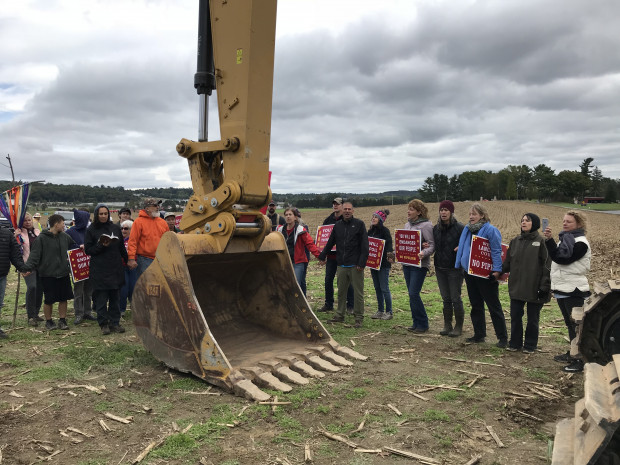Nuns want court to hear their religious objections to Atlantic Sunrise pipeline
-
Jon Hurdle

Marie Cusick / StateImpact Pennsylvania
Protesters blocked pipeline construction equipment on the property of The Adorers of the Blood of Christ, an order of Catholic nuns, in Lancaster County in October. On Friday, the nuns asked an appeals court to allow them to make their religious objections to the pipeline in a lower court.
A group of Catholic nuns took their fight against a natural gas pipeline to an appeals court on Friday, urging three judges to send the case back to a district court that earlier refused to hear it.
An attorney for the Adorers of the Blood of Christ asked the Third Circuit Court of Appeals in Philadelphia to order the lower court to hear the nuns’ case against the Atlantic Sunrise Pipeline, part of which is being built on their land in Lancaster County’s Hempfield Township.
Attorney Dwight Yoder said the nuns should be allowed to argue that their rights have been violated under the federal Religious Freedom Restoration Act (RFRA), and that they should make that case to the U.S. Court for the Eastern District of Pennsylvania, which said last year that it had no jurisdiction to hear it.
“Our argument is that the Adorers still had the right under the plain language of the act to make a claim,” Yoder told the appeals court hearing, which was attended by about 50 of the nuns’ supporters.
The nuns have filed suit against the pipeline’s builder, Transco, and the Federal Energy Regulatory Commission, which approved the interstate pipeline and granted a certificate of public convenience. The certificate allowed Transco to obtain land through eminent domain from any owner such as the Adorers, who declined its offers of compensation.
The nuns believe they have a spiritual responsibility to protect the natural world from the fossil fuels that would be carried in the pipeline, and have built an open-air chapel right next to the pipeline right-of-way to emphasize their ownership.
In October, 23 people were arrested for blocking pipeline construction equipment on the nuns’ property.
Sister Janet McCann, one of the nuns, said at a news conference after the hearing that the ongoing fight against the pipeline shows that the nuns do not live the quiet, uneventful lives that might be expected from a religious order.
“There are times when our religious beliefs compel us to speak out,” she said.
Transco argues that the nuns could have objected to the pipeline plan when it was under review by federal regulators for two years, but they did not, and it is now too late to do so. The company and FERC say the nuns are not entitled under the Religious Freedom Restoration Act to file their “eleventh hour” appeal.
“There was an opportunity for the Adorers to present themselves to the agency and they chose not to avail themselves of the process,” Susanne Chu, an attorney for FERC, told the court.
Since the nuns did not take the opportunity to comment on FERC’s process of evaluating the pipeline application, they can no longer use the religious freedom law to challenge the pipeline and evade a process for pipeline applications that is required by the federal Natural Gas Act (NGA), Transco argues.
“The Adorers cannot now use RFRA to avoid the consequences of their inaction, which would create a means for any opponent of pipeline projects to bypass the administrative procedures mandated by the NGA,” the company wrote in its appeal brief.
The company also argued that the Adorers failed to respond to a motion by the company to take their land through eminent domain.
In a court document, Transco also said the nuns’ claim “rings hollow” because they previously allowed a natural gas pipeline to be built on their land to supply a retirement home.
Yoder argued that the nuns waited to make their claim under the religious freedom act because it was not violated by Transco until the property was taken under eminent domain.
“It says you have a right to a cause of action after your religious beliefs have been substantially burdened, and so that didn’t occur until August of this past year when Transco actually condemned their property,” Yoder said after the hearing.
When complete, Atlantic Sunrise will carry natural gas from the Marcellus Shale through 10 Pennsylvania counties over some 200 miles.
















